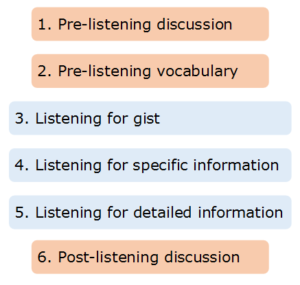What are academic listening skills?

This is the second of four chapters about Academic Listening Skills. To complete this reader, read each chapter carefully and then unlock and complete our materials to check your understanding.
– Introduce the three general types of listening skill
– Explore the common structure of a listening-skills class
– Discuss the six additional academic listening skills
Before you begin reading...
-
video and audio texts
-
knowledge checks and quizzes
-
skills practices, tasks and assignments
Chapter 2
As with all skills, improving your listening will take time and practice. When learning general English, tutors will therefore often provide various guided activities to give ample opportunity for listening practice. Such activities usually involve focusing on the three specific listening skills listed below:
1. Listening for Gist
This is when a student listens for the overall idea of what an audio text is saying or describing without focussing too much on the finer details of that text. This type of listening is usually necessary the first time an audio excerpt is played, after which the tutor may ask some general comprehension questions, such as ‘How many speakers were there?’ or ‘What was the topic of this discussion?’. Because overall meaning is the main focus here, unknown vocabulary can be mostly ignored.
2. Listening for Specific Information
The second type of listening is when a listener focuses on certain key words in order to begin to understand the main ideas of the audio text. Perhaps the listener needs to hear a date or a figure to answer some simple or closed comprehension questions for a task that their teacher has set. It’s therefore not necessary at this stage for the listener to think too deeply about what they’re listening to, but to instead focus only on the key and specific surface information.
3. Listening for Detailed Information
Listening for detailed information is particularly useful for open comprehension question such as those that ask why or how, as this type of listening requires the student to listen particularly carefully – and to perhaps consider deeper implications of the audio text or to make inferences based on what the speaker may or may not be saying. The teacher might set questions such as ‘What do you think the speaker’s overall opinion was of that topic?’, or ‘Why do you think speaker A avoided responding to speaker B about X?’ to get their students thinking a little more deeply.
Activities involving these three types of listening will usually be carefully constructed and supported with pre- and post-listening tasks to increase the student’s chances of success. The following is a typical structure in such a listening-oriented class:

However, these are not the only listening skills that a language learner must have to deal with, and the structure provided above may in fact not be used at all by a professor whose background is not in language teaching or EAP. We’ve therefore isolated six additional skills below that a listener must learn to improve if they wish to increase their listening success.
1. Listening and Reading
Firstly, a successful listener must be able to listen to a speaker while simultaneously reading additional information, such as any notes that the teacher writes on the whiteboard, any handouts they’ve been given, or any illustrations provided through visual data such as PowerPoint presentations.
2. Listening while Notetaking
A good listener, particularly an academic one, must also be able to take notes during a lecture, both for concepts and facts and perhaps even for new vocabulary items. Not only must a language learner be able to do all these things at the same time, but they must able to write quickly and comprehensively – perhaps through the use of shorthand or symbols to improve their notetaking speed.
3. Listening for Cues
Additionally, it’s important that a student who wishes to improve their listening skills is able to recognise a wide variety of lecture and discussion cues that a speaker may call upon for various reasons. Such lecture cues may be used to transition from one topic to another, to provide supporting details for a concept, or perhaps to signal the general organisation of a talk or lecture.
4. Listening to Multiple Speakers
One of the hardest aspects of multitasking when listening is being able to listen to multiple speakers providing their opinions and ideas at the same time. Such a situation may occur in a group discussion or during a class seminar, for example. Sometimes such speakers may take it in turns to speak, in which case the listener will only need to focus on the accents or pacing of each individual speaker. However, at other times, especially during heated debate, speakers may end up talking over each other, and so it can be difficult to separate each speaker even for natives. Nevertheless, the more practice you have at this, the better you’ll be at dealing with this situation effectively.
5. Dealing with Unknown Vocabulary
Subject-specific vocabulary may be one difficult aspect of listening in an academic context, as it’s indeed true that a student will be required to simultaneously consider an unknown or uncertain vocabulary item while still continuing to listen to the lecturer. It’s important therefore that students don’t spend too long considering such vocabulary. Ultimately, what’s important is that you note down these vocabulary items, continue listening, and return to them later.
6. Thinking of a Response
Finally, as well as listening to your tutor, the lecture, or a discussion amongst your peers, and as well as having to deal with new vocabulary or making notes while listening, you may very well also be required to respond if called upon to answer a question or contribute to the debate. You’ll therefore likely have to both listen and consider your opinion or stance on the topics being discussed at the same time. While this is of course a natural human skill, being able to do so easily in a second language will take considerable practice.
Now that you understand the different skills involved in successful listening, the next chapter is about considering the varied contexts using these skills.
Downloadables
Once you’ve completed all four chapters about academic listening skills, you might also wish to download our beginner, intermediate and advanced worksheets to test your progress or print for your students. These professional PDF worksheets can be easily accessed for only a few Academic Marks.
Collect Academic Marks
-
100 Marks for joining
-
25 Marks for daily e-learning
-
100-200 for feedback/testimonials
-
100-500 for referring your colleages/friends